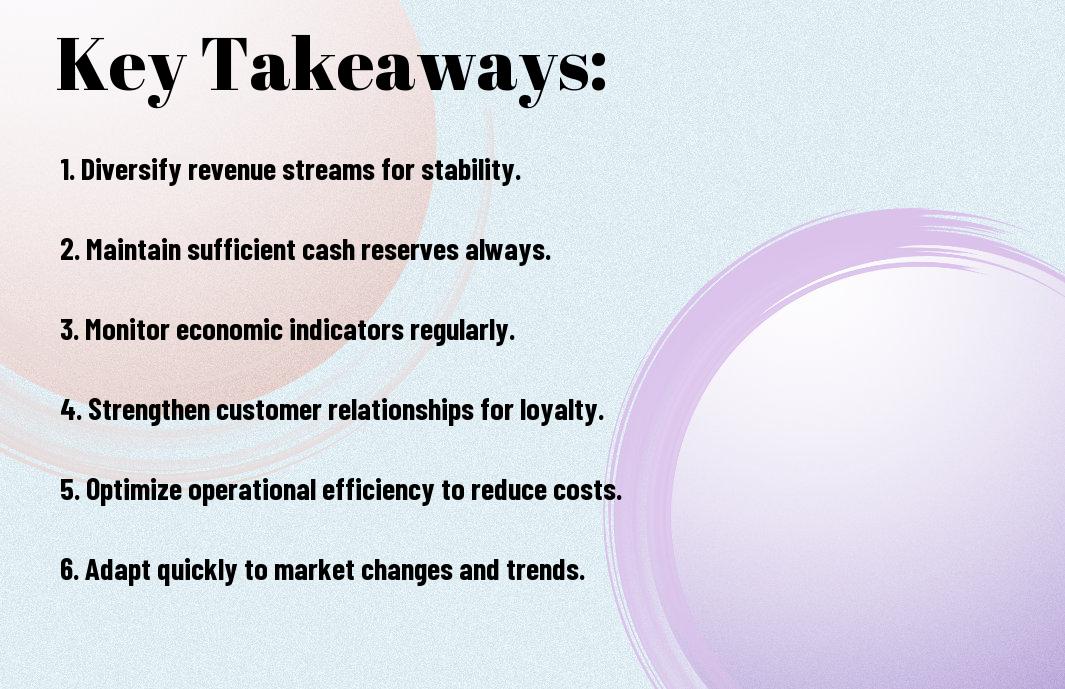Most entrepreneurs face the challenges of economic fluctuations at some point in their journey, making it important for you to develop strategies to safeguard your business. By understanding the potential risks and taking proactive measures, you can build resilience that will help you navigate through downturns effectively. In this post, you will discover practical steps to fortify your operations, manage costs, and identify new opportunities, ensuring your business remains strong during uncertain times.
Key Takeaways:
- Diversify your revenue streams to reduce dependency on a single source of income.
- Build a solid cash reserve to provide a financial cushion during tough economic times.
- Invest in marketing to maintain brand visibility and customer loyalty, even during downturns.
- Streamline operations to enhance efficiency and cut unnecessary expenses.
- Conduct regular risk assessments to identify vulnerabilities and mitigate potential impacts on your business.

Understanding Economic Downturns
Before you can effectively protect your business from the unexpected, it’s imperative to understand economic downturns. These periods are characterized by a decline in economic activity, affecting consumer spending and business performance. To gain insights into how to shield your business, check out 27 Top Ways to Recession-Proof Your Business.
Definition and Causes
Economic downturns refer to a period of decreased economic activity, typically marked by falling GDP, rising unemployment, and reduced consumer confidence. Common causes include high inflation rates, reduced consumer spending, and external shocks such as natural disasters or global pandemics.
Historical Impact on Businesses
Along history, economic downturns have profoundly impacted businesses across various sectors. Companies often face declining revenues, increasing operational costs, and the need to make difficult decisions about workforce and resources.
Historical data shows that businesses that fail to adapt during downturns may struggle to recover. For instance, the 2008 financial crisis led many businesses into bankruptcy, while others that pivoted their strategies managed to thrive. Understanding these patterns can help you make informed decisions and better prepare your business for future challenges.
Assessing Your Business Vulnerabilities
Any business owner should take the time to evaluate their company’s vulnerabilities to stay resilient during economic downturns. By understanding where your business stands, you can implement targeted strategies to mitigate risks and ensure sustainability. This proactive approach will help safeguard your operations and bolster your profitability in challenging times.
Financial Health Check
Assessing your financial health is necessary for understanding the stability of your business. This involves reviewing your cash flow, profit margins, and debt levels. By analyzing these financial metrics, you can identify trends that may signal potential issues, allowing you to take corrective measures before problems escalate.
Identifying Weaknesses
Against any potential risks, recognizing weaknesses within your business operations can significantly enhance your resilience. This includes evaluating your supply chain, marketing strategies, and customer base. A thorough analysis will reveal areas that might be vulnerable during economic strain, enabling you to strengthen these facets and prepare for potential challenges.
Check your operational processes to pinpoint inefficiencies that could hinder your business when the market shifts. Are there dependencies on a single supplier? Are your marketing channels diversified enough to attract a broad audience? By examining these factors, you can pinpoint weaknesses that need addressing, making your business more agile and better equipped to face economic challenges.
Diversifying Your Revenue Streams
Once again, diversifying your revenue streams is an effective approach to protect your business against economic downturns. By spreading your income sources across various products, services, and markets, you’ll lessen the risk tied to a single revenue source. For more insights, check out 4 Things You Should Do to Protect Your Business During a … This strategic shift can help you maintain financial stability even when market conditions become challenging.
Expanding Product Lines
At the forefront of revenue diversification is the expansion of your product lines. By introducing new products that complement your existing offerings, you can appeal to a wider audience and attract different customer demographics. Consider the preferences of your current customers and identify gaps in the market. This proactive measure not only enhances customer loyalty but can also create additional sales opportunities.
Exploring New Markets
At this stage, exploring new markets can provide substantial growth potential for your business. By identifying and penetrating new geographical areas or demographic segments, you can tap into fresh customer bases that may not be familiar with your brand. Research market trends and customer preferences in these new areas to strategically approach your entry.
The exploration of new markets also allows you to mitigate risks associated with economic downturns in your primary market. If one market faces challenges, having your products or services available in another can help sustain your overall business health. Adopt a flexible marketing approach and consider partnerships with local businesses to ease the entry process and expand your reach effectively.
Building a Strong Cash Reserve
Now is the time to prioritize building a strong cash reserve to safeguard your business against economic downturns. A well-stocked cash reserve allows you to weather unexpected expenses, manage cash flow fluctuations, and seize opportunities when they arise. By committing to saving a portion of your profits regularly, you can create a financial buffer that will help you navigate uncertain times with confidence.
Importance of Liquidity
Below are a few reasons why maintaining liquidity is important for your business’s longevity. Liquidity ensures you have immediate access to cash when faced with operational costs, unexpected repairs, or to capitalize on sudden opportunities. A strong liquidity position provides financial peace of mind, making it easier for you to make informed decisions without the pressure of urgent cash needs.
Strategies for Savings
An effective strategy for increasing your cash reserves involves a combination of disciplined saving and financial planning. Start by regularly setting aside a percentage of your profits into a dedicated savings account. Automate your savings to make this process seamless. Additionally, review your monthly expenses to identify areas where you can cut back, redirecting those funds to your cash reserve. This proactive approach builds your financial cushion without detracting from your operational needs.
Due to the unpredictable nature of economic conditions, it’s wise to adopt a multifaceted savings approach. Consider creating a separate account specifically for your cash reserve to avoid the temptation of using those funds for everyday expenses. Set specific savings goals and timelines to keep yourself accountable. Moreover, explore various income streams to bolster your overall revenue, making it easier to allocate funds towards your savings. By tightening your operational costs while exploring opportunities for growth, you’ll enhance your liquidity and ensure your business is well-prepared for any financial turbulence ahead.
Strengthening Customer Relationships
All businesses should prioritize strengthening customer relationships during economic downturns to maintain stability. Open communication and understanding customer needs can help you build trust and reduce churn. Explore strategies like personalizing experiences and providing exceptional support to enhance loyalty. For more insights, check out Preparing Your Company for the Next Recession.
Enhancing Customer Service
Along with understanding your customers, enhancing your customer service can significantly improve relationships. Providing timely responses, effective solutions, and proactive engagement helps to foster a reliable atmosphere. This attention to service enables your customers to feel valued, encouraging them to choose your business even in tough times.
Building Loyalty Programs
With a well-structured loyalty program, you can reward your customers for their continued support. This not only encourages repeat purchases but also strengthens your brand’s presence in their mind. Tailoring rewards that resonate with your audience can lead to deeper connections and a sense of community around your brand.
For instance, you might consider offering tiered rewards based on customer spending, exclusive discounts, or early access to new products. By aligning your loyalty programs with your customers’ preferences, you cultivate a relationship that goes beyond transactions. This not only motivates customers to engage more but also turns them into advocates for your business, which is invaluable during economic downturns.

Adapting Your Business Model
After facing an economic downturn, it is vital that you reassess and adapt your business model to align with current market conditions. This may involve exploring new revenue streams, re-evaluating pricing strategies, or pivoting to meet changing customer demands. By remaining flexible and open to change, you can position your business for recovery and growth.
Embracing Technology
Across industries, businesses are leveraging technology to enhance efficiency and streamline operations. By integrating tools such as automation, cloud computing, and digital communication, you can reduce costs and improve service delivery, serving your customers better while also keeping your workforce engaged and productive.
Flexible Operations
Technology has empowered many businesses to adopt flexible operations that can quickly respond to fluctuations in demand. By embracing remote work solutions, you maintain operational continuity while reducing overhead costs. Additionally, adopting agile project management methodologies allows you to pivot rapidly, enabling your team to focus on priority tasks without being bogged down by rigid structures.
The ability to implement flexible operations not only saves you money but also enhances employee morale as teams can adapt their work-life balance to better suit their personal needs. It fosters a culture of trust, encouraging innovation and collaboration among your staff. As you adopt these practices, it’s important to keep communication lines open, ensuring everyone is aligned on business goals while being adaptable to change.
Final Words
With these considerations, you can better safeguard your business against economic downturns. By diversifying your revenue streams, maintaining a robust cash reserve, and closely monitoring your expenses, you’ll position your business to weather financial storms. Additionally, fostering strong customer relationships and adapting to market changes will ensure your business remains resilient. Proactively planning and leveraging strategic insights will empower you to navigate uncertain times effectively, allowing you to focus on long-term growth and stability.
FAQ
Q: What are the key strategies for protecting my business during an economic downturn?
A: To shield your business from economic downturns, consider implementing the following strategies: First, build a robust emergency fund to cover operational expenses for several months. Second, diversify your product or service offerings to attract a broader customer base, reducing reliance on a single revenue stream. Third, streamline operations to improve efficiency and cut unnecessary costs while maintaining quality. Additionally, focus on building strong relationships with customers and suppliers to enhance loyalty and support during tough times.
Q: How can I reduce costs without sacrificing the quality of my products or services?
A: Reducing costs while maintaining quality requires a balanced approach. Start by reviewing your existing expenses to identify areas where you can cut back without impacting overall service delivery. Consider renegotiating contracts with suppliers for better rates or seeking out alternative suppliers who can provide comparable materials at lower prices. Streamlining processes through automation or improved workflows can also reduce labor costs. Finally, seek employee input for innovative ideas on improving efficiency and reducing waste in operations.
Q: What financial practices should I adopt to prepare for an economic downturn?
A: Establishing sound financial practices is crucial for weathering economic downturns. Start by conducting regular financial assessments to monitor cash flow and adjust budgets accordingly. Foster a habit of prudent spending and limit high-risk investments that could jeopardize your financial stability during uncertain times. It’s also wise to stay informed about changes in market conditions and adjust your financial strategies proactively. Additionally, maintaining a good relationship with financial institutions can provide easier access to credit when needed.
